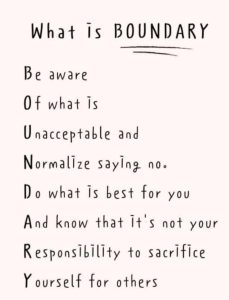Boundaries are essential in defining where one line concludes and another commences. Understanding the different types of boundaries can help navigate various relationships and situations effectively on a personal and professional level. Here are six common types of boundaries:
1. Physical Boundaries: These boundaries pertain to personal space and touch. They establish physical comfort levels and preferences.
2. Emotional Boundaries: Emotional boundaries safeguard one's feelings, needs, and mental well-being. They help in maintaining emotional stability and self-respect.
3. Intellectual Boundaries: Intellectual boundaries involve respecting others' thoughts, ideas, and opinions. They encourage healthy debates and discussions while valuing diverse perspectives.
4. Material Boundaries: Material boundaries revolve around personal possessions and resources. They define ownership, sharing, and respecting others' belongings.
5. Time Boundaries: Time boundaries involve managing commitments, priorities, and schedules. They help in balancing work, personal life, and leisure effectively.
6. Social Boundaries: Social boundaries determine the extent of involvement in social interactions and relationships. They assist in establishing healthy social connections while maintaining individual identity.

Understanding and implementing these different types of boundaries can contribute significantly to personal growth, self-awareness, and maintaining healthy relationships.
Are you a people pleaser? Do you struggle to say no when something doesn't feel right? If yes, please contact me today to arrange a counselling session. Looking forward to working with you and helping you move forward